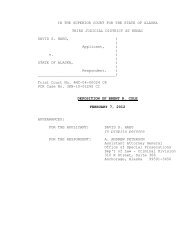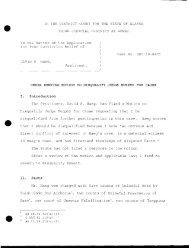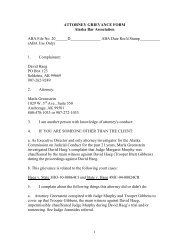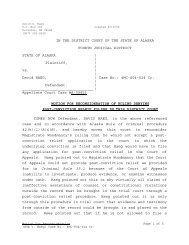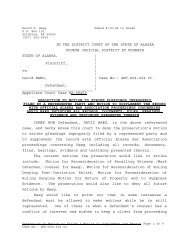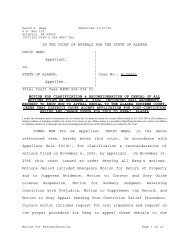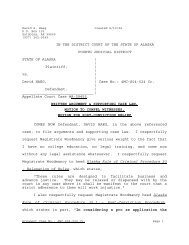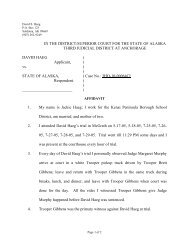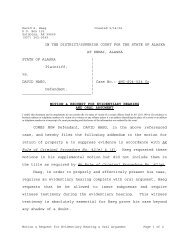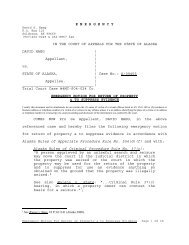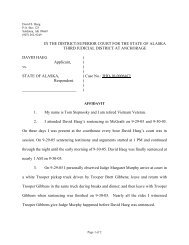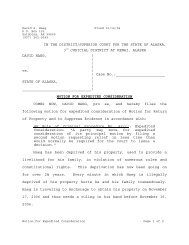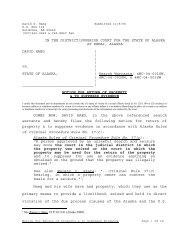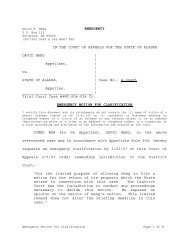- Page 1 and 2:
Exhibit 1 AFFIDAVIT FOR SEARCH WARR
- Page 3 and 4:
the GPS, or to mark the locations o
- Page 5 and 6:
Haeg complains that I suborned perj
- Page 8 and 9:
11/11/04 Recording of Cole while he
- Page 10 and 11:
Cole: The thing that was taken away
- Page 12 and 13:
you to protect my interest. I know
- Page 14 and 15:
Cole: I don't know why he didn't do
- Page 16 and 17:
Cole: Well I - I that's a difficult
- Page 18 and 19:
Cole: But the only thing the DA sai
- Page 20 and 21:
Cole: Do you remember me telling hi
- Page 22 and 23:
Program -um- and initially I was la
- Page 24 and 25:
Creek, take kids out of school, peo
- Page 26 and 27:
Fitzgerald: That was really my firs
- Page 28 and 29:
saw someone that if the State wante
- Page 30 and 31:
the attorney client privilege and I
- Page 32 and 33:
Haeg: ...think of a better way. -Um
- Page 34 and 35:
Cole: In the past. Was. That's righ
- Page 36 and 37:
Shaw: Mr. Haeg. Haeg: I'm sorry. Be
- Page 38 and 39:
tell me." "Well I'm not happy they
- Page 40 and 41:
Haeg: Ok so he changed his mind bef
- Page 42 and 43:
Cole: "On Monday, November 8 th you
- Page 44 and 45:
Cole: You thought it was. I didn't.
- Page 46 and 47:
Exhibit 5 EXCERPT OF HAEG’S IMMUN
- Page 48 and 49:
Exhibit 7 ZELLER’S IMMUNIZED STAT
- Page 50 and 51:
Trooper Gibbens: I don’t remember
- Page 52 and 53:
Exhibit 9 November 4, 2004: In the
- Page 54 and 55:
All of which is a Class A Misdemean
- Page 56 and 57:
wolves sealed. Haeg provided the in
- Page 58 and 59:
Exhibit 10 November 8, 2004: DAVE H
- Page 60 and 61:
Exhibit 11 November 8, 2004: In the
- Page 62 and 63:
Count IX That on or about March 26,
- Page 64 and 65:
On 3/22/04, Haeg and Zellars flew a
- Page 66 and 67:
Count V That on or about March 23,
- Page 68 and 69:
After calling in the report, Haeg a
- Page 70 and 71:
Exhibit 13 PROOF, WHICH IS STILL IN
- Page 72 and 73:
Both men have pleaded not guilty to
- Page 74 and 75:
But the state’s controversial pre
- Page 76 and 77:
Exhibit 15 RECORDINGS OF ROBINSON 7
- Page 78 and 79:
Robinson: Yeah I told you ... Haeg:
- Page 80 and 81:
Robinson: And so... Stoumbaugh: He
- Page 82 and 83:
Robinson: But that doesn’t addres
- Page 84 and 85:
Robinson: Listen what I’m saying
- Page 86 and 87:
Robinson: Yeah he told me about tha
- Page 88 and 89:
Robinson: I’m sorry David Haeg: a
- Page 90 and 91:
Robinson: Because after I had Joe i
- Page 92 and 93:
Haeg: Ok well the malpractice that
- Page 94 and 95:
Haeg: ... I was out to lunch. Robin
- Page 96 and 97:
___________________________________
- Page 98 and 99:
Haeg: I just wasted a whole bunch o
- Page 100 and 101:
Haeg: Him essentially selling me ou
- Page 102 and 103:
stood up for my deal and I wanted t
- Page 104 and 105:
Haeg: by me and Leaders the judge d
- Page 106 and 107:
was a bad guide”. Well what the h
- Page 108 and 109:
ROBINSON: Well I don’t know who y
- Page 110 and 111:
Why were you flying to McGrath Did
- Page 112 and 113:
5. As soon as Mr. Leaders successfu
- Page 114 and 115:
9. Should we also point out Leaders
- Page 116 and 117:
RETURN I served the above subpoena
- Page 118 and 119:
Exhibit 16 EXCERPT OF RECORD PROVIN
- Page 120 and 121:
Exhibit 18 Trooper Gibbens sworn te
- Page 122 and 123:
Exhibit 20 56 QUESTIONS FOR BRENT C
- Page 124 and 125:
28. What was your response 29. Do y
- Page 126 and 127:
Exhibit 21 TROOPER GIBBENS FALSE TE
- Page 128 and 129:
Exhibit 24 TAPE RECORDINGS OF OSTER
- Page 130 and 131:
een a government wacky and she has
- Page 132 and 133:
plus the losses you had sustained a
- Page 134 and 135:
Mr. Osterman: Well you got - you go
- Page 136 and 137:
Mr. Osterman: I want you involved.
- Page 138 and 139:
OSTERMAN: Ok. (indecipherable) HAEG
- Page 140 and 141:
HAEG: Ok. OSTERMAN: Because lets fa
- Page 142 and 143:
OSTERMAN: Mm hmm. HAEG: He knew but
- Page 144 and 145:
out. You bring that up and it will
- Page 146 and 147:
OSTERMAN: You’ve - bear with me f
- Page 148 and 149:
HAEG: Yeah. OSTERMAN: …and the mi
- Page 150 and 151:
OSTERMAN: Yeah they’re talking ab
- Page 152 and 153:
HAEG: Got him on tape saying, “no
- Page 154 and 155:
OSTERMAN: They give it to us. You d
- Page 156 and 157:
things that have to be done yet to
- Page 158 and 159:
OSTERMAN: Sure. HAEG: And now it lo
- Page 160 and 161:
OSTERMAN: No. HAEG: Why not OSTERMA
- Page 162 and 163:
HAEG: Yeah there’s was none. OSTE
- Page 164 and 165:
HAEG: No it aint. That - that issue
- Page 166 and 167:
HAEG: How long did we have the open
- Page 168 and 169:
OSTERMAN: Well that’s what happen
- Page 170 and 171:
looked like you know your - I mean
- Page 172 and 173:
OSTERMAN: Ok. So Chuck’s screwed.
- Page 174 and 175:
HAEG: So there’s no chance of Chu
- Page 176 and 177:
HAEG: So I don’t even see why he
- Page 178 and 179:
HAEG: How come I have Supreme Court
- Page 180 and 181:
OSTERMAN: Right if a crime happen w
- Page 182 and 183:
OSTERMAN: Not necessarily no. HAEG:
- Page 184 and 185:
Mr. Osterman: What does that mean M
- Page 186 and 187:
Mr. Osterman: No kidding. That's ex
- Page 188 and 189:
Mr. Osterman: Well you didn't the o
- Page 190 and 191:
carelessness or negligence but thos
- Page 192 and 193:
Mr. Osterman: Well you're not deali
- Page 194 and 195:
e on the record and when I get to t
- Page 196 and 197:
Mr. Osterman: Well things that were
- Page 198 and 199:
Mr. Haeg: - no it's what I have pro
- Page 200 and 201:
you a permit to go shoot wolves wit
- Page 202 and 203:
not going to work effectively. The
- Page 204 and 205:
Mr. Osterman: Listen Mr. Haeg: ...
- Page 206 and 207:
wheeled out this tape see and then
- Page 208 and 209:
Mr. Haeg: Hey. Hey Mark you know wh
- Page 210 and 211:
Mr. Haeg: I didn't mention that I k
- Page 212 and 213:
Mr. Osterman: Well I know you tape
- Page 214 and 215:
Mr. Osterman: Mm hmm. Mr. Haeg: Wel
- Page 216 and 217:
Mr. Osterman: The other issue that
- Page 218 and 219:
Law Office of Mark Osterman 215 Fid
- Page 220 and 221:
already notified the Governor becau
- Page 222 and 223:
or counsel's continuing representat
- Page 224 and 225:
defense and should promptly comply
- Page 226 and 227:
ing up that there was a Rule 11 Agr
- Page 228 and 229:
228
- Page 230 and 231:
MAGISTRATE WOODMANCY: Ok and -uh- f
- Page 232 and 233: MR. OSTERMAN: -Uh- Mr. Haeg you had
- Page 234 and 235: the same as hunting a deer out in t
- Page 236 and 237: I've ever seen in my life. I have r
- Page 238 and 239: MR. OSTERMAN: Well not necessarily
- Page 240 and 241: MR. OSTERMAN: I already told you th
- Page 242 and 243: information provided by Mr. Haeg -u
- Page 244 and 245: MR. OSTERMAN: Well I - you know aga
- Page 246 and 247: MR. HAEG: Ok and did he state how m
- Page 248 and 249: JACKIE HAEG: Yes he was - very. MR.
- Page 250 and 251: JACKIE HAEG: Yeah he felt the he -
- Page 252 and 253: to him along with the tons of casel
- Page 254 and 255: MR. HAEG: Because when I paid him h
- Page 256 and 257: we could have something we could li
- Page 258 and 259: EXHIBIT 26 STATE OF ALASKA 14 PAGE
- Page 260 and 261: conviction of a pro se defendant. M
- Page 262 and 263: his right to an attorney, he cannot
- Page 264 and 265: IV. Conclusion Based on the forgoin
- Page 266 and 267: Tamara Russell, Psy.D., MHC IV Lice
- Page 268 and 269: Haeg: If you made a Rule 11 Agreeme
- Page 270 and 271: Fitzgerald: I - I don't know how to
- Page 272 and 273: Fitzgerald: Yeah that's what I'm sa
- Page 274 and 275: statement made during plea negotiat
- Page 276 and 277: were using. They also found a spent
- Page 278 and 279: She also revoked Haeg’s guiding l
- Page 280 and 281: makes it a crime for any person lic
- Page 284 and 285: At sentencing, the State is allowed
- Page 286 and 287: Once the case was remanded, Haeg
- Page 288 and 289: To support his claim under Alaska
- Page 290 and 291: Exhibit 32 JUDICIAL COMPLAINT DISMI
- Page 292 and 293: 292
- Page 294 and 295: Exhibit 34 ABA BAR EXAM QUESTIONS A
- Page 296 and 297: selling their boats to avoid forfei
- Page 298 and 299: ear arms). B. The Second Variable -
- Page 300 and 301: Exhibit 35 SUCCESSFUL INEFFECTIVE A
- Page 302 and 303: to a defendant that it constitutes
- Page 304 and 305: United States v. Hernandez, 450 F.
- Page 306 and 307: Nance v. Ozmint, 626 S.E.2d 878 (S.
- Page 308 and 309: Instead, Haeg said, when he asked t



